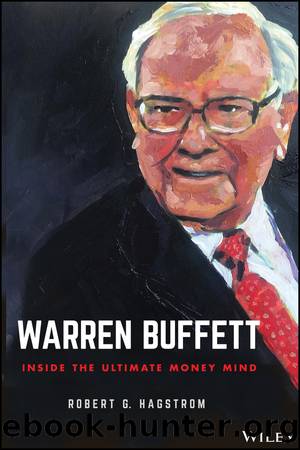Warren Buffett by Robert G. Hagstrom

Author:Robert G. Hagstrom [Hagstrom, Robert G.]
Language: eng
Format: epub
ISBN: 9781119714644
Publisher: Wiley
Published: 2021-03-09T00:00:00+00:00
CHAPTER 4
BusinessâDriven Investing
âInvestment is most intelligent when it is most businesslike.â1
That's Ben Graham in his landmark book, The Intelligent Investor.
âThese are the nine most important words ever written about investing.â2
That's Warren Buffett, Graham's most famous pupil.
Although we have moved past Graham's methods for valuing stocks, his counsel for how to think about stocks as businesses is both enduring and invaluable.
As far back as 1917, when Graham wrote his first article for The Magazine of Wall Street, he held a steadfast belief that there was a better way to think about investing, and it was not speculating about what the next fellow was going to do with his shares. At the heart of Ben Graham's approach was an appreciation that, in the world of investing, the temperament of a businessperson was far superior to that of a speculator. Having said this, he was dismayed to âsee how many capable businessmen try to operate in Wall Street with complete disregard of all sound principles through which they have gained success in their own undertakings.â3
Graham believed that someone who purchased common shares in a company had earned âdouble statusâ and that it was their choice to decide which action to take. They could view themselves as a âminority stockholder in a businessâ whose fortune was âdependent on the profits of the enterprise or on a change in the underlying value of its assets.â Or they could see themselves holding âa piece of paper, an engraved stock certificate, which could be sold in a matter of minutes at a price which varies from moment to momentâwhen the market is open, that isâand often far removed from the balanceâsheet value.â4 That is, they have to choose between being a businessâowner or a stock speculator.
The tugâofâwar between those points of view was a matter of deep concern for Graham. Throughout his life, he made note of the losing battle. âThe development of the stock market in the recent decades,â he wrote in 1973, âhas made the typical investor more dependent on the course of the price quotations and less free than formerly to consider himself merely a businessâowner.â5 It seemed to him that the news of the momentâany momentâobscured the more important financial data that would determine one's longâterm prospects. âThe investor who permits himself to be stampeded or unduly worried by unjustified market declines in his holdings,â he wrote, âis perversely transforming his basic advantage into a basic disadvantage. That man would be better off if his stocks had no market quotation at all [italics mine], for he would then be spared the mental anguish caused him by other personsâ mistakes of judgment.â6
It should come as no surprise that Warren Buffett, Graham's most famous student, adopted the same thinking. âStocks as businessesâ has been the cornerstone of Warren's investment approach for 65 years. A stock market, he once said, âis by no means essential; a prolonged suspension of trading in the securities we hold would not bother us any more than does the lack of daily quotations on World Book or Fechheimer,â two of Berkshire's wholly owned businesses.
Download
This site does not store any files on its server. We only index and link to content provided by other sites. Please contact the content providers to delete copyright contents if any and email us, we'll remove relevant links or contents immediately.
| Analysis & Strategy | Bonds |
| Commodities | Derivatives |
| Futures | Introduction |
| Mutual Funds | Online Trading |
| Options | Portfolio Management |
| Real Estate | Stocks |
Rich Dad Poor Dad by Robert T. Kiyosaki(6632)
Pioneering Portfolio Management by David F. Swensen(6300)
How To Win Friends and Influence People by Dale Carnegie(4512)
The Money Culture by Michael Lewis(4207)
The Dhandho Investor by Mohnish Pabrai(3764)
The Wisdom of Finance by Mihir Desai(3746)
Liar's Poker by Michael Lewis(3447)
Fooled by Randomness: The Hidden Role of Chance in Life and in the Markets by Nassim Nicholas Taleb(3124)
The ONE Thing by Gary Keller(3071)
Mastering Bitcoin: Programming the Open Blockchain by Andreas M. Antonopoulos(3042)
The Intelligent Investor by Benjamin Graham Jason Zweig(3041)
The Psychology of Money by Morgan Housel(3036)
Rich Dad Poor Dad: What The Rich Teach Their Kids About Money - That The Poor And Middle Class Do Not! by Robert T. Kiyosaki(2958)
Investing For Dummies by Eric Tyson(2953)
How to Day Trade for a Living: Tools, Tactics, Money Management, Discipline and Trading Psychology by Andrew Aziz(2949)
How to Win Friends and Influence People by Dale Carnegie(2915)
Market Wizards by Jack D. Schwager(2700)
How to Pay Zero Taxes, 2018 by Jeff A. Schnepper(2655)
Zero Hour by Harry S. Dent Jr. & Andrew Pancholi(2647)
